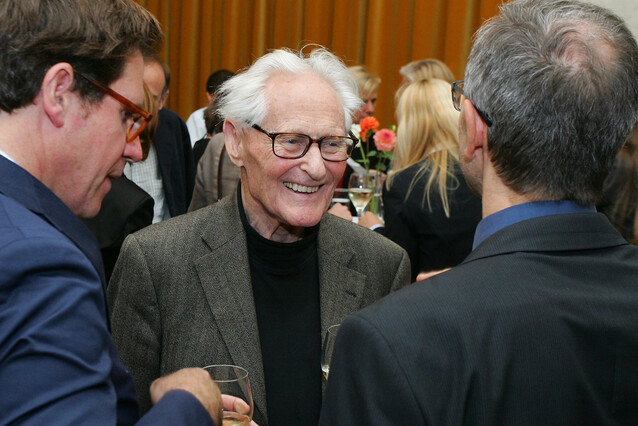In memoriam: Hans Tuppy (1924 - 2024)
Hans Tuppy, biochemist, science politician, and friend of the IMP since its foundation, passed away only months before his 100th birthday. In Tuppy, the Vienna BioCenter has lost one of its founding fathers.
The IMP received the sad news that Hans Tuppy, whose work with Boehringer Ingelheim and many other roles provided crucial support for the development of IMP and the Vienna BioCenter, passed away on 24 April - only months before his 100th birthday.
Born in 1924 and raised in Vienna, Hans Tuppy studied chemistry at the University of Vienna in the 1940s, followed by a doctorate. From 1948, he conducted research on the sequence of bovine insulin in Frederick Sanger's laboratory in Cambridge, United Kingdom – following a recommendation of Max Perutz. After a further postdoctoral research stay in Copenhagen, Tuppy returned to Vienna in the early 1950s, where he habilitated in 1956.
From the late 1950s, Hans Tuppy maintained close and far-reaching links with Boehringer Ingelheim. The corporation’s institute for cancer research (Institut für Arzneimittelforschung) was founded in the early 1960s under the guidance of Hans Tuppy. Free in its choice of research questions, it formed the foundation for the flourishing oncology research still carried out by Boehringer Ingelheim at its Regional Center Vienna today and created a blueprint and substrate for the founding of the IMP in the mid-1980s.
In 1963, Tuppy became Professor of Biochemistry at the University of Vienna and was Dean of its Faculty of Medicine from 1970 to 1972. Two years later, he was elected President of the Austrian Science Fund (FWF), a position he held until 1982. Tuppy succeeded in introducing international standards in project funding that are still valid today, such as the international peer-review of funding applications.
In 1983, Tuppy was elected Rector of the University of Vienna and chaired the Rectors' Conference of Austrian universities. In 1985 - the year the IMP was founded - he was elected President of the Austrian Academy of Sciences (ÖAW), an office he resigned from in 1987 in favour of an appointment as Federal Minister of Science.
In his role as Federal Minister, Hans Tuppy’s support was crucial in the relocation of those institutes of the University of Vienna that were related to molecular biology to St. Marx, in the immediate vicinity of the IMP. This move was completed in 1993 and opened up extensive synergies for IMP and the University of Vienna. After the relocation, IMP and the institutes (which would later become today's Max Perutz Labs) were jointly referred to as “Vienna BioCentre”. Hans Tuppy is thus one of the founding fathers of the campus, which today boasts six research organisations, two universities and more than 35 biotech companies. As Emeritus Professor of Max Perutz Labs, Hans Tuppy remained associated with the Vienna BioCenter until his death and was a regular guest at campus events.
Over the course of his career, Tuppy worked on a range of scientific topics. He decoded the structure of oxytocin, succeeded in the enzymatic conversion of blood group substances, and discovered a group of neuraminic acid derivatives with antiviral effect. He was also involved in the discovery of mitochondrial DNA.
Hans Tuppy was awarded numerous honorary doctorates, the Austrian Decoration of Honour for Science and Art (1975), the Wilhelm Exner Medal (1978) and the Wittgenstein Prize of the Austrian Research Foundation (2002). The Austrian Academy of Sciences established the annual "Hans Tuppy Lecture" in his honour in 2016, whose first speakers were two former members of the IMP, Kim Nasmyth and Adrian Bird. Hans Tuppy was a member of several learned societies, including the Pontifical Academy of Sciences, the Austrian Academy of Sciences, and the German Academy of Sciences Leopoldina.
